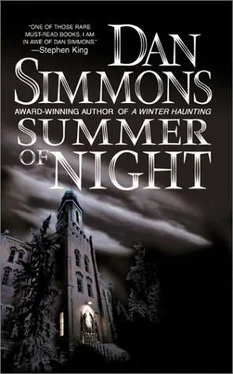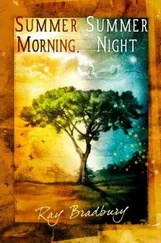Dan Simmons - Summer of Night
Здесь есть возможность читать онлайн «Dan Simmons - Summer of Night» весь текст электронной книги совершенно бесплатно (целиком полную версию без сокращений). В некоторых случаях можно слушать аудио, скачать через торрент в формате fb2 и присутствует краткое содержание. Год выпуска: 1991, Жанр: Ужасы и Мистика, на английском языке. Описание произведения, (предисловие) а так же отзывы посетителей доступны на портале библиотеки ЛибКат.
- Название:Summer of Night
- Автор:
- Жанр:
- Год:1991
- ISBN:нет данных
- Рейтинг книги:3 / 5. Голосов: 1
-
Избранное:Добавить в избранное
- Отзывы:
-
Ваша оценка:
- 60
- 1
- 2
- 3
- 4
- 5
Summer of Night: краткое содержание, описание и аннотация
Предлагаем к чтению аннотацию, описание, краткое содержание или предисловие (зависит от того, что написал сам автор книги «Summer of Night»). Если вы не нашли необходимую информацию о книге — напишите в комментариях, мы постараемся отыскать её.
Bram Stoker (nominee)
"An American nightmare with scares, suspense, and a sweet, surprising nostalgia, one of those rare must-read books. I am in awe of Dan Simmons."
Stephen King
Summer of Night — читать онлайн бесплатно полную книгу (весь текст) целиком
Ниже представлен текст книги, разбитый по страницам. Система сохранения места последней прочитанной страницы, позволяет с удобством читать онлайн бесплатно книгу «Summer of Night», без необходимости каждый раз заново искать на чём Вы остановились. Поставьте закладку, и сможете в любой момент перейти на страницу, на которой закончили чтение.
Интервал:
Закладка:
Mike slid to a stop at the intersection of Depot and Second Avenue, the schoolyard an entire block of darkness behind them.
"Tomorrow?" he said.
"Yeah," said Dale.
"Yeah," said Lawrence.
Mike nodded and was gone.
Dale and Lawrence put their bikes around back on the small open porch. They could see their mother moving around in the lighted kitchen. She was baking something and her face was flushed.
"Listen," said Lawrence, grabbing his older brother's hand.
Across the street, in the darkness around Old Central, there was a sibilant rush as of voices speaking hurriedly in an adjoining room.
"It's just a TV somewhere . . ." began Dale, but then he heard the sound of breaking glass, a shout quickly stifled.
They stood there another minute but a wind had come up and the leaves rustling in the broad oak over the drive drowned any further sound.
"Come on," said Dale, still holding his brother's hand.
They went into the light.
FOUR
Duane McBride waited in Bandstand Park until the Old Man got drunk enough to be thrown out of Carl's Tavern. It was past eight-thirty when the Old Man came staggering out, stood weaving on the curb, shook his fist and shouted curses at Dom Steagle, the owner of Carl's (there had been no Carl since 1943), and then tumbled into the pickup, cursing as he dropped his keys on the floor, cursing again as he found them, ground the starter, and flooded the engine. Duane hurried. He knew that the Old Man was drunk enough to forget that Duane had ridden with him when they had come into town almost ten hours earlier "to pick up a few things at the coop."
"Duanie," said the Old Man, squinting at his son. "What the hell are you doing here?"
Duane said nothing, letting the Old Man's memory work.
"Oh, yeah," the Old Man said at last, "did you see your friends?"
"Yeah, Dad." Duane had left Dale and the others in late afternoon when they'd gone over to the city ballpark to play a pickup game. There had been a chance that the Old Man would stay sober enough to head home before Dom threw him out.
"Hop in, kiddo." The Old Man was enunciating with the precise care and south Boston accent that came out only when he was seriously drunk.
"No thanks, Dad. I'll ride in the back if that's OK."
The Old Man shrugged, ground the starter again, and got the heap started. Duane jumped into the back next to the tractor parts they'd picked up that morning. He stuck his notebook and pencil in his shirt pocket and crouched low on the metal truckbed, peering over the side, hoping that the Old Man wouldn't rack up this new GM junker the way he had the last two used trucks they'd owned.
Duane saw Dale and the others riding down Main in the dim light, but he didn't think they'd seen this vehicle before so he lay low in the truckbed while the Old Man weaved past. Duane heard the shouted "Lights!" but the Old Man ignored them or hadn't heard. The truck screeched around the corner on First Avenue and Duane sat up in time to see the old brick home on the east side-the Slave House the town kids called it although most didn't know why.
Duane knew why. It was the old Thompson place and it had been a way station on the Underground Railroad in the 1850s. Duane had become interested in the slave escape route when he was in third grade and had done some research in the city library over in Oak Hill. Besides the Thompson place, there had been two other Underground Railroad way stations in Creve Coeur County . . . one, an old frame farmhouse belonging to a Quaker family in the Spoon River valley toward Peoria, had burned down before the Second World War. But the other one had belonged to the family of a kid in Duane's third-grade class and one Saturday Duane had ridden his bike there-eight and a half miles each way-just to see the place. Duane had shown the kid and his family where the hidden room was behind the closet under the stairway. And then he had pedaled home. The Old Man hadn't been drinking that Saturday and Duane had avoided a beating.
They roared past Mike O'Rourke's place, out past the city ballpark north of town, and turned east at the water tower. Duane shifted around in the truckbed as they hit gravel. He hunkered down and closed his eyes as gravel flew and dust surrounded him, tickling his neck under his heavy plaid shirt, settling in his hair and between his teeth.
The Old Man didn't run off the road, although he almost missed the turnoff to County Road Six. The truck braked, skidded, tipped, righted itself, and then they were pulling nto the crowded parking lot of the Black Tree Tavern.
"I'll be just a minute, Duanie." The Old Man slapped at Juane's arm. "Just stop in to say hi to the boys before we head home to work on the tractor."
"OK, Dad." Duane settled lower into the pickup bed, propped his head against the back of the cab, and pulled out his worn notebook and pencil. It was full dark now, the stars were visible beyond the trees behind the Black Tree, but enough yellow light spilled through the screen door to allow Duane to read if he squinted.
The notebook was thick, warped with sweat and smeared with dust, and the pages were almost filled with Duane's tiny script. There were almost fifty similar notebooks in the secret hiding place in his basement room at home.
Duane McBride had known that he wanted to be a writer since he was six years old. Duane's reading-he had read complete books since he was four years old-had always been another world for him. Not an escape, since he rarely sought escape ... writers had to confront the world if they were going to observe it accurately . . . but another world nonetheless. One filled with powerful voices relaying even more powerful thoughts.
Duane would always love the Old Man for sharing books and the love of reading with him. Duane's mother had died before he was old enough to really know her, and the intervening years had been rough, what with the farm going to hell and the Old Man's drinking, the occasional beatings and even more occasional abandonments, but there were good times too-the normal flow of days when the Old Man was on the wagon, the easy cycle of hard work in the summers even if they couldn't keep up, the long evenings with the two of them talking to Uncle Art . . . three bachelors cooking steaks in the backyard and talking about everything under the stars, including the stars.
Duane's old man had dropped out of Harvard but gotten his master's in engineering at the University of Illinois before coming back to run his mother's farm. Uncle Art had been a traveler and poet-merchant marine one year, teaching at private schools in Panama or Uruguay or Orlando the next. Even when they drank too much, their talk was interesting to the third bachelor in the circle, young Duane, and he drank in information with the insatiable appetite of the terminally gifted.
No one in Elm Haven or in the Creve Coeur County school system thought of Duane McBride as gifted. The term simply did not exist in 1960 rural Illinois. He was fat. He was odd.
The teachers often had described him-in written comments and the rare parent-teacher conferences-as unkempt, unmo-tivated, and inattentive. But not a discipline problem. Merely a disappointment. Duane did not apply himself.
When confronted by his teachers, Duane would apologize, smile, and amble on with whatever private thoughts and projects were possessing him at the time. School was not a problem, not even a hindrance really since he liked the idea of school ... it was merely a distraction from his studies and his preparation for becoming a writer.
Or it would have been merely a distraction if there hadn't been something about Old Central that bothered him. Not the kids so much. Not even the principal and teachers, slow-witted and provincial as they seemed. There was something else.
Читать дальшеИнтервал:
Закладка:
Похожие книги на «Summer of Night»
Представляем Вашему вниманию похожие книги на «Summer of Night» списком для выбора. Мы отобрали схожую по названию и смыслу литературу в надежде предоставить читателям больше вариантов отыскать новые, интересные, ещё непрочитанные произведения.
Обсуждение, отзывы о книге «Summer of Night» и просто собственные мнения читателей. Оставьте ваши комментарии, напишите, что Вы думаете о произведении, его смысле или главных героях. Укажите что конкретно понравилось, а что нет, и почему Вы так считаете.












